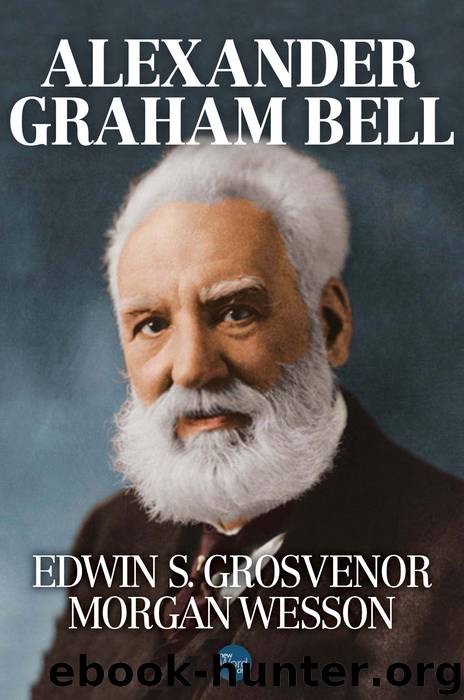Alexander Graham Bell by Edwin S. Grosvenor

Author:Edwin S. Grosvenor [Edwin S. Grosvenor and Morgan Wesson]
Language: eng
Format: epub
Tags: Biography/Science and Technology - BIO015000
ISBN: 9781612309569
Publisher: New Word City, Inc.
Published: 2016-05-10T04:00:00+00:00
Until the expiration of Alexander Graham Bell’s patents in 1893 and 1894, only the richest North Americans could afford telephones. Now the legal system that had protected one man’s invention opened the science and engineering of telephony to others, raising the curtain on a new era of pell-mell expansion in the telephone business. In relative terms, only a handful of people had their own telephones at the beginning of this era, since American Bell had expanded the telephone system at a rate of only 6 percent annually since 1881; the number of phones in America had only roughly doubled by 1893. In contrast, by late 1907, the number would increase twentyfold - to a total of 6,118,578 - and only 51 percent of these telephones were owned by American Bell.
American Bell was a great investment between 1877 and 1894 when it paid stockholders $25,895,811 in profit. But during the same time, a relatively meager $16,135,808 was turned back into the company, its lines, and equipment. Instead of investing in expanding the telephone market, American Bell relied upon its lead in technology and its long-distance network to conquer future competitors. In February 1893, less than a month before Bell’s first patent expired, the Chicago Evening Journal summed up the situation: “The American Bell Company has for years been forearming itself against the ides of March, 1893. By purchase and otherwise it has acquired the patent right of almost every practicable telephone transmitter and receiver. Hundreds of such patent rights, through which alone successful competition might come, lie securely locked in the safes of the big parent Bell Company, never to see the light of day, it may be, unless the company adopts them for its own apparatus.”
American Bell’s control of technology was only one problem for new independent telephone companies. The sheer magnitude of tooling up an industry from scratch was also an enormous obstacle. Poles, wire, phones, legal support, trade journals, switchboards, and a trained workforce all had to be built up to supply new companies, most assembled with local leadership and capital. Nevertheless, in cities American Bell had not entered, on farms, and in small town - in every place still needing telephones - opportunity beckoned. To distinguish themselves from American Bell and AT&T, the new telephone companies were often named the Home Telephone company. And independent inventors - people much like Bell himself - played a key role in their growth.
Against this frenzied background, telephone technology was anything but static. In the ongoing attempt to improve the quality and range of telephone signals, some researchers looked back to William Thomson, the first great scientist to accept Bell’s telephone, whose own work on the telegraph had earned him a knighthood. His findings suggested that research should focus on controlling the electrical resistance of phone lines. Others tried to solve the problem of attenuation, by focusing on the unexplored science of amplification.
As George A. Campbell at American Bell tackled the resistance problem, a Serbian scientist and independent electrical inventor, Columbia University Professor Michael Pupin, finally solved it.
Download
This site does not store any files on its server. We only index and link to content provided by other sites. Please contact the content providers to delete copyright contents if any and email us, we'll remove relevant links or contents immediately.
Hit Refresh by Satya Nadella(9117)
When Breath Becomes Air by Paul Kalanithi(8420)
The Girl Without a Voice by Casey Watson(7879)
A Court of Wings and Ruin by Sarah J. Maas(7809)
Do No Harm Stories of Life, Death and Brain Surgery by Henry Marsh(6931)
Shoe Dog by Phil Knight(5255)
The Rules Do Not Apply by Ariel Levy(4953)
A Higher Loyalty: Truth, Lies, and Leadership by James Comey(4946)
Hunger by Roxane Gay(4920)
Tuesdays with Morrie by Mitch Albom(4765)
Everything Happens for a Reason by Kate Bowler(4729)
The Immortal Life of Henrietta Lacks by Rebecca Skloot(4571)
Millionaire: The Philanderer, Gambler, and Duelist Who Invented Modern Finance by Janet Gleeson(4460)
How to Change Your Mind by Michael Pollan(4350)
All Creatures Great and Small by James Herriot(4304)
The Money Culture by Michael Lewis(4188)
Man and His Symbols by Carl Gustav Jung(4120)
Elon Musk by Ashlee Vance(4118)
Tokyo Vice: An American Reporter on the Police Beat in Japan by Jake Adelstein(3973)
